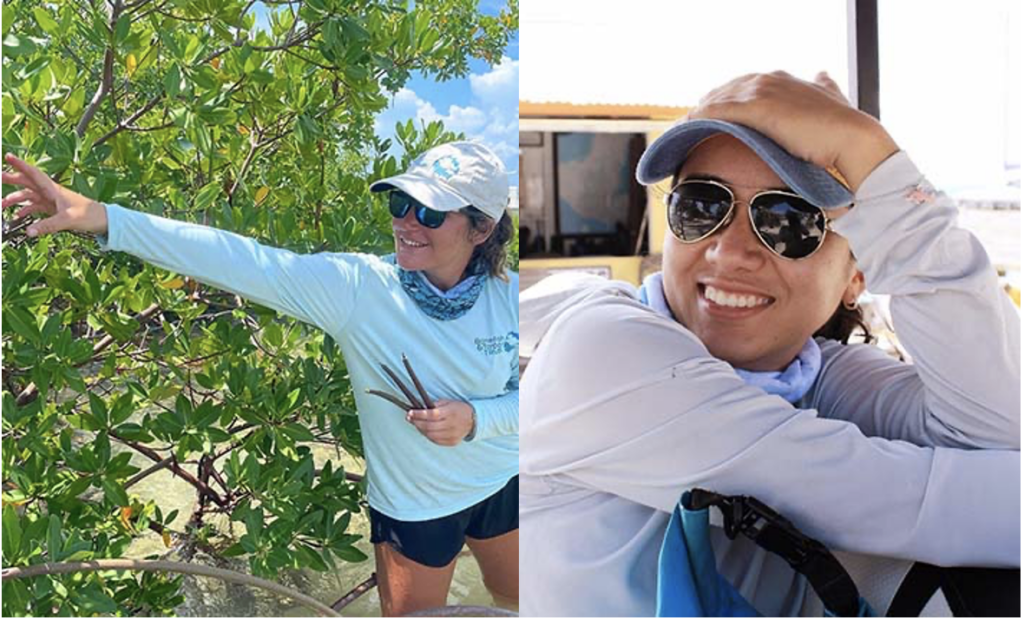Nina Sanchez and Lysandra Chan
By Chris Santella
The foundation of BTT’s work rests in the field. It’s here that the data points essential to the organization’s scientific work are collected. And it’s here that the important connections with stakeholders—be it guides, commercial fishermen, interested citizens or government officials—are forged, the connections that are essential to BTT’s partnership model.
BTT is excited to have two talented young women representing the organization in the Bahamas and Belize, Nina Sanchez and Lysandra Chan. For both, field research, education and advocacy are logical next steps for lives spent enjoying marine environments.
“I just about grew up in the water,” says Nina Sanchez, BTT Bahamas Initiative Coordinator. A native Bahamian, Sanchez started scuba diving at age ten; when her parents needed a babysitter, they’d send Nina to her grandparents’ boat for a cruise around the islands. In the relatively short time that she’s been diving, Sanchez has seen a great deal of change, especially in terms of the health of the coral reefs. “I became interested in conservation work as a way to help serve and make a difference.”
Sanchez’s conservation career began while she was still in high school. “I knew Justin Lewis’s [BTT’s Bahamas Initiative Manager] family in Freeport, and they knew I was interested in marine biology. Justin offered me an internship. If there were researchers coming to study bonefish, I’d help them with their fieldwork. I also did some coral restoration work for a different organization, but this was depressing—I didn’t like watching the coral dying.” Sanchez attended university in Nova Scotia at St. Francis Xavier University, pursuing a degree in Aquatic Resources and Public Policy with Social Research. When she returned to the Bahamas, Lewis asked if she was interested in working for BTT. She joined as an official employee in June of 2022.
One major initiative that Sanchez has been spearheading is the Northern Bahamas Mangrove Restoration Project. Mangroves are the foundation of flats ecosystems, and many of Grand Bahama and Abaco’s vast mangrove systems were devastated by Hurricane Dorian in 2019. Sanchez has been engaged in all stages of the project. “We’ve been collecting seeds from areas not impacted, cultivating the seeds in a nursery and planting them with the help of local students,” she explains. “I enjoy the work on the flats, but also the outreach to interested parties—community groups, anglers, student groups, everyone you can imagine. Every day is a new day, with new people and often new places; I see something cool and different each time. And I’ve been inspired by the many people I’ve met.” To date, more than 30,000 mangroves have been planted for the project, which will plant 100,000 in areas hardest hit by Dorian.
Though she was born in a landlocked Belizean town, Belize-Mexico Initiative Technical Assistant Lysandra Chan was never a stranger to the Caribbean. “As far as I can remember, the best times were days spent at Caye Caulker where I enjoyed the splendors of the sea with my family,” Chan recalls. “My dad and uncles were commercial fishermen, and other members of my family worked in tourism, so early on I became aware of the important connections between healthy ecosystems and the livelihoods they support. Fun fueled interest which became a passion and that’s when I knew I’d always be involved in science and conservation.”
Chan pursued a Bachelor’s degree of Science in Biology from the University of Belize. Her interest in watershed ecology led to the completion of a report concerning the agricultural and industrial impacts on a river near her home in Orange Walk Town, “Morphological Characterization of the New River: A Preliminary Study.” Soon after, she became the Northern Belize Coastal Complex Project Coordinator for a non-governmental organization, Sarteneja Alliance for Conservation and Development. Here she supported the seascape collaboration and communication among protected area management units, which were geared towards improving conservation outcomes that benefitted both people and wildlife.
Since joining BTT in June of 2022 as a Technical Assistant, Chan has supported the organization’s work in Belize and Mexico, both in the office and the field, in a number of ways. “The job has great variety,” she says. “I’ve been involved in supporting research activities and community outreach efforts among other tasks, such as graphic design for educational materials for Belize. I’ve really enjoyed working with Dr. Perez and Dr. Adams.”
More recently, Chan has been working with Kellie Ralston BTT Vice President for Conservation and Public Policy as BTT’s Belize program grows. Chan shared that BTT representatives are meeting with government officials and all sorts of Belizean stakeholders while beginning to develop new partnerships with Marine Protected Area co-managers, community associations, fishing guides, and others. “This is a very exciting time for our team,” says Chan.
Though neither Sanchez or Chan have ruled out graduate school in the future, both hope to continue their conservation education in their roles with BTT. This will include catch-and-release angling. “Justin has taken me out a few times, and one time I hooked a huge permit, 25 pounds,” Sanchez says. “I fought it for ten minutes, but it came off as we were trying to net it.”
“I’ve had some casting lessons from Omar Arceo, known as the “Doctor of the Flats” in Belize,” Chan adds. “Addiel has also shared some do’s and don’ts. I haven’t caught my first bonefish yet. But by the next time we chat, I’ll have gotten my grand slam.”
Chris Santella is the author of 21 books, including the popular “Fifty Places” series from Abrams. He’s a regular contributor to The New York Times, The Washington Post, and Trout.




